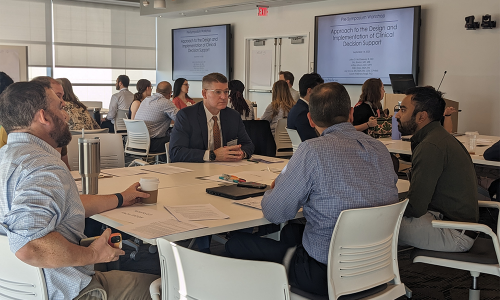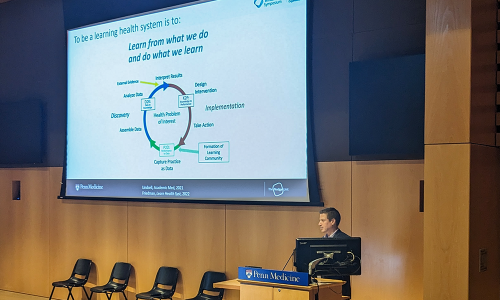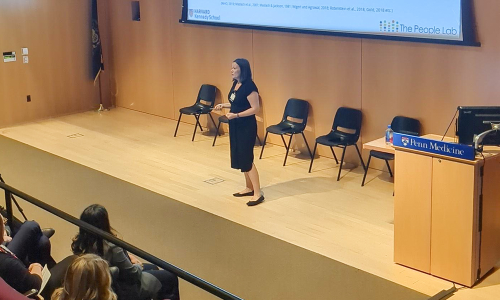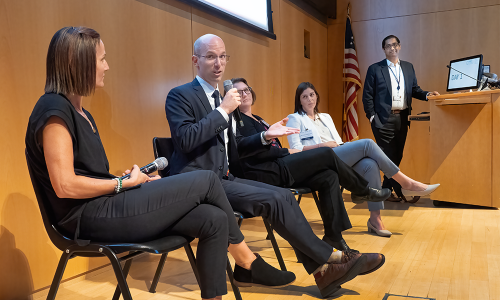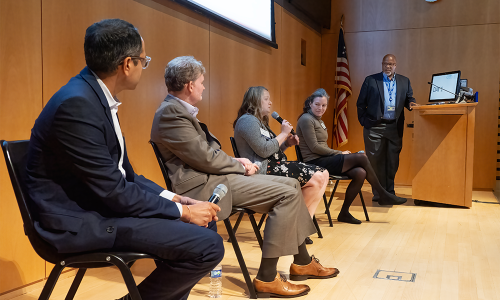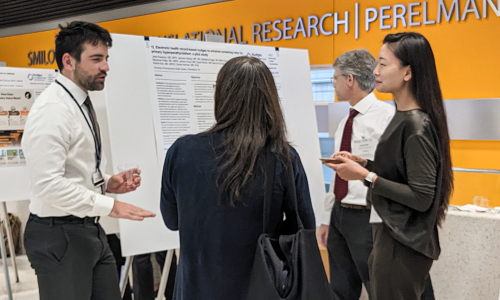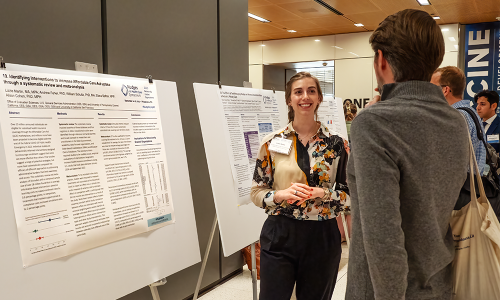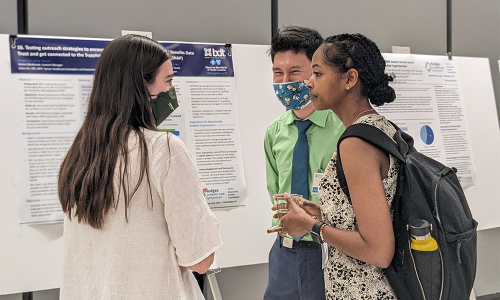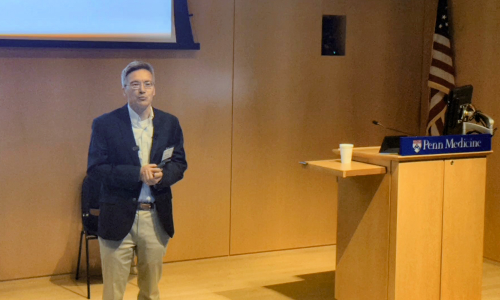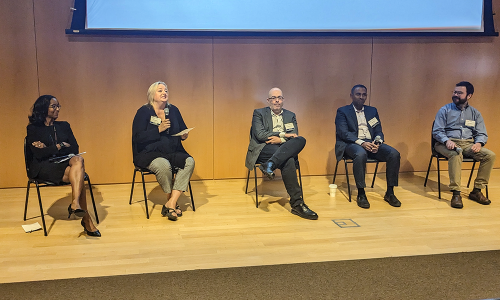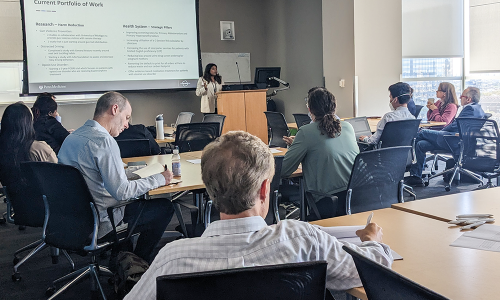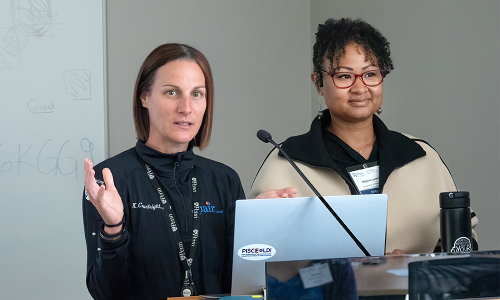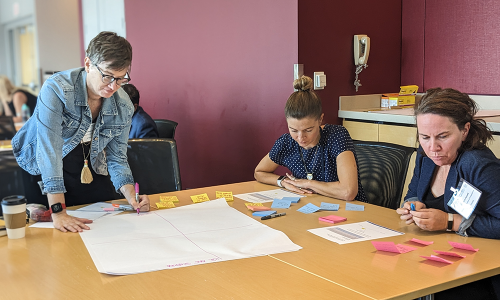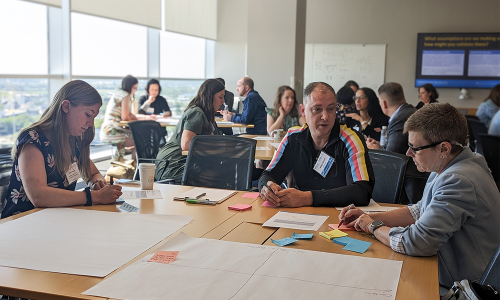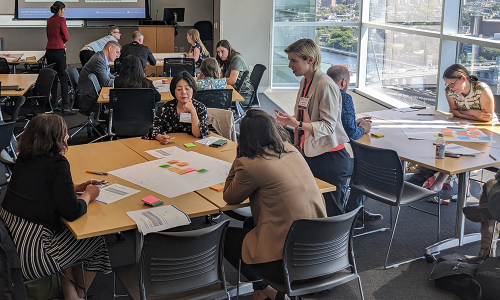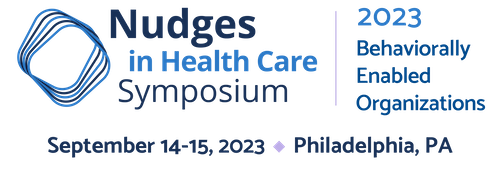 The 2023 Nudges in Health Care Symposium brought together stakeholders from health systems nationwide to share insights about creating behaviorally enabled organizations.
The 2023 Nudges in Health Care Symposium brought together stakeholders from health systems nationwide to share insights about creating behaviorally enabled organizations.
Jump to a section: News | Agenda | Photos | Videos | Keynote Speakers | Contact
Agenda
Here you'll find an overview of the Symposium agenda followed by a downloadable PDF with a detailed list of activities and speakers.
Pre-symposium workshop on EHR clinical decision support nudges
Welcome remarks
Keynote with Dr. Elizabeth Linos: "Burnout on the Frontline: Using Behavioral Science to Support Employee Well-being"
Stories from the Field:
- Applications of AI and machine learning
- Balancing clinician nudges with wellness
Cocktail hour & poster session
Breakfast
Keynote with Dr. Kevin Volpp: "Behavioral Science at a Crossroads: Nudges Past, Present, and Future"
Panel discussion: Lessons learned in building behaviorally informed organizations
Workshops:
- Operationalizing nudge units
- Rapid validation and experimentation approaches
- Implementation-effectiveness trial designs
Lunch, awards, and closing remarks
Photo Gallery
Videos
Keynote Speakers
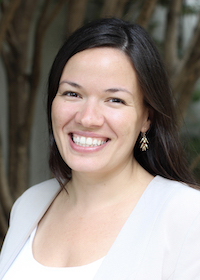 Elizabeth Linos, PhD
Elizabeth Linos, PhD
"Burnout on the Frontline: Using Behavioral Science to Support Employee Well-being"
Dr. Elizabeth Linos is the Emma Bloomberg Associate Professor for Public Policy and Management, and Faculty Director of The People Lab at the Harvard Kennedy School of Government. The majority of her research focuses on how to improve government by focusing on its people and the services they deliver. Specifically, she uses insights from behavioral science and evidence from public management to consider how to recruit, retain, and support the government workforce, how to reduce administrative burdens that low-income households face when they interact with their government, and how to better integrate evidence-based policymaking into government.
Her research has been published in various academic journals including The Journal for Public Administration Research and Theory, Public Administration Review, Econometrica, American Economic Journal: Economic Policy, Behavioural Public Policy, and others. Her work has also been highlighted in media outlets including The New York Times, The Economist, BBC, NPR, Slate, and the Harvard Business Review. As the former VP and Head of Research and Evaluation at the Behavioral Insights Team in North America, she worked with government agencies in the US and the UK to improve programs using behavioral science and to build capacity around rigorous evaluation. Prior to this role, Dr. Linos worked directly in government as a policy advisor to the Greek Prime Minister, George Papandreou, focusing on social innovation and public sector reform.
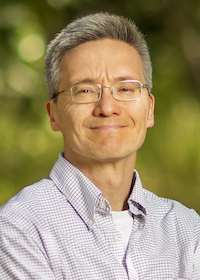 Kevin G. Volpp, MD, PhD
Kevin G. Volpp, MD, PhD
"Behavioral Science at a Crossroads: Nudges Past, Present, Future"
Dr. Kevin Volpp is the founding Director of the Penn Center for Health Incentives and Behavioral Economics (CHIBE) and the Mark V. Pauly President’s Distinguished Professor at the Perelman School of Medicine and the Wharton School of the University of Pennsylvania. He has led CHIBE since its inception turning it into an entity which became one of two original NIH Centers on behavioral economics and health and that involves more than 90 faculty members and trainees.
Dr. Volpp’s work focuses on developing and testing innovative ways of applying insights from behavioral economics in improving patient health behavior and increasing health system value by influencing provider performance. Dr. Volpp oversaw the creation of the world’s first health system Nudge Unit at Penn Medicine. He has published more than 300 articles, book chapters, and commentaries. His work has served as the foundation for benefit design initiatives using financial incentives for smoking cessation used by many large employers including GE and CVS, a prescription refill synchronization program for Humana members, a redesign of a primary care physician payment for clinicians across Hawaii, a simple health insurance plan called “Humana Simplicity”, and an ‘enhanced active choice’ approach used among tens of millions of CVS members to increase the ease of receiving automated medication refills. He now leads the American Heart Association (AHA) Rockefeller Foundation Food is Medicine Initiative, a major research program designed to build evidence on effectiveness and cost effectiveness of programs to improve health through better access to nutritious food.
Contact
Questions about the Symposium? Contact us at nudge.unit@pennmedicine.upenn.edu.
Curious about previous symposia? Visit our main Nudges in Health Care Symposium page, where you'll find recap articles, recordings, and more.
